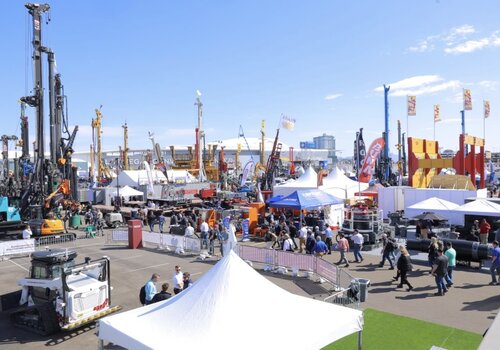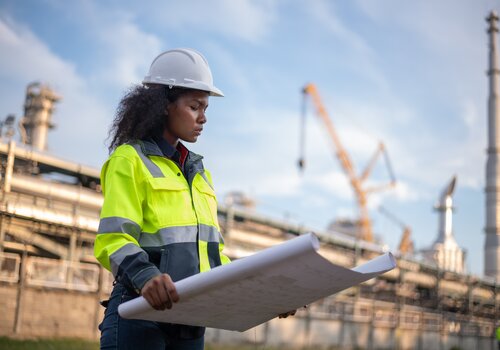In physically demanding jobs like construction, hydration is essential to not only worker productivity but also safety. This is especially the case when the heat index climbs above the 103°F mark.
The CDC says water will almost always help workers maintain proper hydration while working in the heat, as long as they eat regular meals to replace the salt lost through perspiration. OSHA says workers should drink at least 8 oz. of cool water every 20 minutes on shorter jobs.
On hot jobs lasting longer than 2 hours, where prolonged sweating can lead to excessive salt loss, OSHA says electrolyte-containing beverages such as sports drinks should be considered. However, the CDC cautions against consuming sports drinks with too much sugar and/or caffeine. A lot of sugar adds a lot of extra calories to a person’s diet. Excessive amounts of caffeine can be risky when added strain is already being placed on the heart.
Drinking alcohol is another bad idea when working in extreme heat. Alcohol can cause dehydration all on its own. Never drink alcohol within 24 hours of working in the heat, much less while on the job.
Options for keeping workers hydrated
An entire industry has built up around the need for tasty, convenient, personal hydration. In other words, construction companies have options when it comes to keeping workers hydrated on the jobsite:
- A cooler filled with tap water and ice
- Bottled water
- Sports drinks low on sugar and caffeine
- Electrolyte-enriched, water-soluble powders
While cool water will often get the job done, some of the other options can offer additional benefits. The right product using the right formulation will also deliver essential minerals. They'll also taste better. And because workers know you've gone out of your way to provide something tasty and nutritious to drink, they'll probably be appreciative and become more loyal.
Construction companies can look at jobsite hydration as an area of investment to bolster employee productivity, safety, and retention. And since it truly is an investment, companies will also want to settle on something that will provide the best return.
The case for powder mixes
Handing out individual bottles of water or sports drinks might sound like the least complex option. It can get costly, however. It may also be difficult for some employees to keep their bottles with them while they work. It can also be a challenge to keep those beverages cold.
Some of the sports drink companies also offer powders that mix with water. When mixed properly to the recommended ratio, these companies say their powders provide the same benefits as their liquid counterparts. Some consumers say the powder versions do not taste as good, but others say the taste difference is negligible. Finally, the cost-per-ounce when using a powder mix is quite a bit less.
Powder sports drink mixes come in various sizes, quantities, and flavors. Small packets are designed for individual bottles of water. Larger bags and canisters allow you to make gallons at a time.
Example: Gatorade Sports Drink Mix is available in a 21-oz. powder pack. That’s enough to yield 2.5 gallons of thirst-quenching beverage.
Sports drink companies aren't the only game in town when it comes to powder mixes. Several nutrition companies offer specialized product lines geared toward dehydration prevention. Two in particular come to mind: Pedialyte and DripDrop ORS.
Like popular sports drinks, these products focus on electrolyte replenishment. Electrolytes are minerals in the body that help balance water and pH levels, move nutrients into your cells, move waste out of your cells, and make sure your nerves and muscles work like they are supposed to. Forget all of that science, though. The bottom line is that when you are low on electrolytes, you can suffer muscle weakness, spasms, cramps, and respiratory problems.
Nutrition companies like Pedialyte and DripDrop say their products do a better job of striking the optimum balance of sugar and sodium, which allows the body to better absorb fluids and electrolytes. Additionally, electrolyte-replenishing powders typically contain several grams of some combination of essential minerals (electrolytes), including potassium, zinc, magnesium, calcium, and chloride.
Example: Pedialyte Powder Packs make it convenient for a worker to mix one packet with 16 oz. of water.
Example: DripDrop Zero is a sugar-free option available in two packet sizes, yielding either 8 oz. or 16.9 oz. of solution.
Construction companies need a plan, and a good cooler
If a construction company decides that powder mixes make the most sense, it will need a plan for mixing and delivering a drinkable beverage at the jobsite. Accessibility is of utmost importance.
A rugged, portable, easy-to-use cooler is essential. Popular brands like Igloo, Coleman, and YETI make insulated coolers that keep ice and beverages cold for hours. Smaller 1-gallon options are great for individual users, while much larger coolers are also available for entire crews to share. Look for features that make the coolers easy to lift, carry or wheel around.
Example: YETI Silo 6-gallon water cooler is designed for easy transport. Unique handles make it easy to carry without getting in the way. Non-slip feet keep it from sliding around on a backseat, while tie-down slots help secure it to a trailer or truck bed.
Example: Igloo 5-gallon water jug features a pressure-fit lid that won’t spill. Sturdy, reinforced handles are designed for heavy loads. This jug also features a handy cup dispenser.
Speaking of cups, that's another component for a construction company to think about. Some employees may have their own insulated tumblers they can use. But for most of the crew, that probably isn't practical. Disposable paper cups represent a safe, sanitary, and cost-effective option. A construction company may even want to look into mounting a cup dispenser if their cooler doesn’t have one. These types of products are widely available from a variety of retailers and hardware stores.
The bottom line is that construction companies must always take dehydration seriously. By having a plan to make staying hydrated easy, workers will see how seriously you're taking it — and then they will, too.











